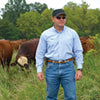October 14, 2016 0 Comments
 Written By Dr. Allen Williams, Ph.D.
Written By Dr. Allen Williams, Ph.D.
A champion of the grass-fed beef industry as well as cutting edge grazing methodology, Allen helps restore natural soil water retention and reduce runoff, increase land productivity, enhance plant and wildlife biodiversity, and produce healthier food. Learn more about Allen
Beyond Meat®, a company that calls itself the Future of Protein™ has recently been the benefactor of investment from what might seem like a strange place. Tyson Foods, a member of the Big Four meat packers, has become a 5% owner in the company that hopes to replace meat with plant-based proteins. According to news reports in the New York Times, Business Insider, and MeatingPlace, the investment is the result of a fundraising initiative by Beyond Meat targeted at providing capital to fund expansion of their product portfolio and distribution.
In a statement by Ethan Brown, Founder and CEO of Beyond Meat, he said, “This investment by Tyson Foods underscores the growing market for plant protein. I’m pleased to welcome Tyson as an investor and look forward to leveraging this support to broaden availability of plant protein choices to consumers.”
At the joint disclosure, a Tyson executive, Monica McGurk, expressed enthusiasm with the investment and added that it “…gives us exposure to a fast-growing segment of the protein market.” McGurk went on to say that the investment will increase consumer choices from the Tyson portfolio of food products and will allow Tyson to satisfy demands from a growing diverse population. She did directly state that Tyson would remain focused on their animal protein base.
Products currently offered in the Beyond Meat portfolio include the Beyond Burger™, single serve meals with Beyond Beef® and Beyond Chicken® protein alternatives, the Beast Burger, and Southwest Style Beyond Chicken® Strips. Most packages have a facsimile of a steer or chicken on them.
Beyond Meat was founded in 2009 as the result of more than a decade of research by a Dr. Fu-Hung Hsieh at the University of Missouri. Hsieh’s research has focused on taking soy proteins and producing meat analogs that are palatable and that appear to be similar to real muscle foods. The Beyond Chicken products are a combination of non-GMO soy and pea protein. The Beast Burger is a 100% pea protein extrusion and is touted as a “soy-free, gluten-free, non-GMO” product.
Whole Foods Markets first started carrying Beyond Meat products in 2013 at select stores. The company’s products are now sold in more than 10,000 stores nationwide.
Other investors in Beyond Meat include Bill Gates, Kleiner Perkins, the founders of Twitter, Biz Stone, General Mills, and the Humane Society of the United States. The former CEO of McDonald’s North American operations, Don Thompson, sits on their board of directors.
The question for us as producers of pasture-based protein products is not whether there will be challenges in the market place from plant-based protein alternatives, but rather how will we respond to that market challenge? There will be a segment of the consumer population that believes plant-based proteins are a better choice for their health and the environment. For those of us in regenerative agriculture, we know that animals in the mix allow for rapid rebuilding of soil organic matter, reduction of erosion, reduced chemical inputs and harmful runoff, increases in plant species diversity, and improvement in pollinator insect, beneficial insect, and wildlife populations.
Animals in the mix allow for rapid rebuilding of soil organic matter, reduction of erosion, reduced chemical inputs and harmful runoff, increases in plant species diversity, and improvement in pollinator insect, beneficial insect, and wildlife populations.
Where crops are grown without the benefit of proper livestock impact, we see serious issues with soil compaction, water infiltration rates, water quality, erosion, harmful runoff, and increased reliance on synthetic chemical inputs and irrigation.
The loss of soil organic matter, soil aggregation, and fertility across farmlands in North America over the past several decades has been staggering. The focus on the current monoculture agricultural model has created a lot of unintended consequences that are proving detrimental to our environment and to human health.
What we have to consider is that animals, particularly the natural mix of large and small ruminants, followed by grassland birds, have played a significant role for millennia in building the tremendous fertility across the grasslands and savannas of the world. For thousands of years these wild ruminants were an essential part of nature’s design moving about in large groups or mobs due to constant pressure from apex predators. The result of their grazing of the grasslands and savannas was incredible diversity and complexity in soil, plant, insect, bird, and animal life.
In regenerative agriculture, we use our livestock and poultry the way nature intended – to build and maintain soil fertility and diversity in soil, plant, insect, and animal life. Moving to a plant only diet will further increase issues brought about by monoculture agricultural systems.
The beautiful thing about raising animals the way we do is that we are reviving nature’s bounty while providing the consumer with protein products that contain favorable fatty acid profiles; are loaded with minerals, vitamins, and antioxidants; and actually improve the environment.
Our problem – the average consumer is unaware of the myriad benefits of raising livestock and poultry in pasture-based systems through regenerative practices. It is incumbent upon us to do a much better job of informing consumers that they do have a choice in their protein purchase decisions.
With so many confusing market claims and labels, the consumer is often left grasping at straws, wondering what is factual and what is simply smoke and mirrors. We must be true to our label claims, clearly communicate to the consumer, and provide factual information to back up those claims. Trust is everything and we must be trustworthy.
May 28, 2025 0 Comments
Follow the full journey of our Poulet Rouge® Chicken—from eggs in France to 12 weeks of pasture-centered care on Carolina farms.
